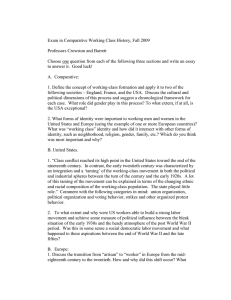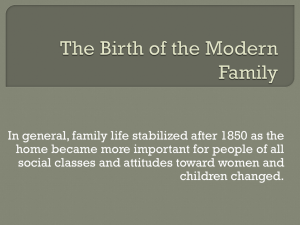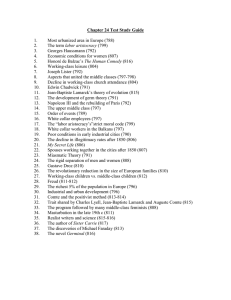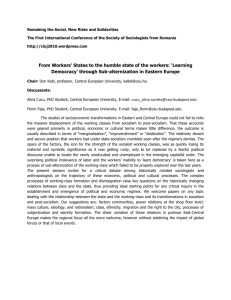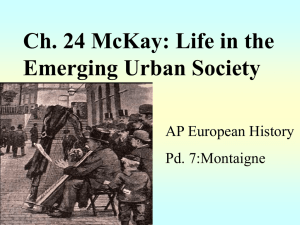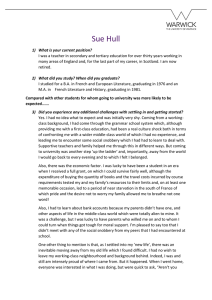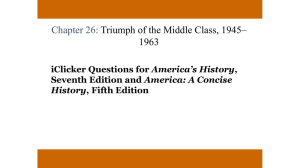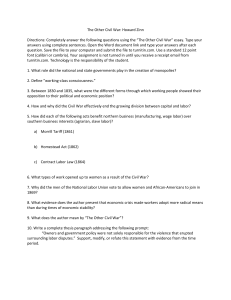Class Matters: Working Class Studies Association Conference Pittsburgh, PA
advertisement
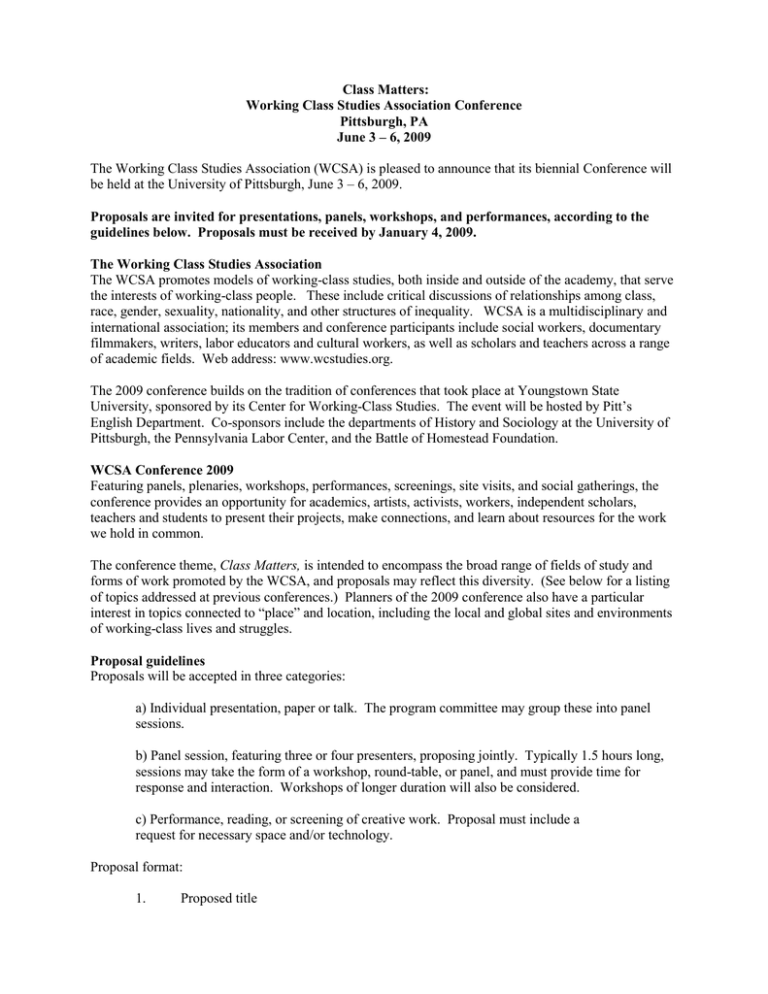
Class Matters: Working Class Studies Association Conference Pittsburgh, PA June 3 – 6, 2009 The Working Class Studies Association (WCSA) is pleased to announce that its biennial Conference will be held at the University of Pittsburgh, June 3 – 6, 2009. Proposals are invited for presentations, panels, workshops, and performances, according to the guidelines below. Proposals must be received by January 4, 2009. The Working Class Studies Association The WCSA promotes models of working-class studies, both inside and outside of the academy, that serve the interests of working-class people. These include critical discussions of relationships among class, race, gender, sexuality, nationality, and other structures of inequality. WCSA is a multidisciplinary and international association; its members and conference participants include social workers, documentary filmmakers, writers, labor educators and cultural workers, as well as scholars and teachers across a range of academic fields. Web address: www.wcstudies.org. The 2009 conference builds on the tradition of conferences that took place at Youngstown State University, sponsored by its Center for Working-Class Studies. The event will be hosted by Pitt’s English Department. Co-sponsors include the departments of History and Sociology at the University of Pittsburgh, the Pennsylvania Labor Center, and the Battle of Homestead Foundation. WCSA Conference 2009 Featuring panels, plenaries, workshops, performances, screenings, site visits, and social gatherings, the conference provides an opportunity for academics, artists, activists, workers, independent scholars, teachers and students to present their projects, make connections, and learn about resources for the work we hold in common. The conference theme, Class Matters, is intended to encompass the broad range of fields of study and forms of work promoted by the WCSA, and proposals may reflect this diversity. (See below for a listing of topics addressed at previous conferences.) Planners of the 2009 conference also have a particular interest in topics connected to “place” and location, including the local and global sites and environments of working-class lives and struggles. Proposal guidelines Proposals will be accepted in three categories: a) Individual presentation, paper or talk. The program committee may group these into panel sessions. b) Panel session, featuring three or four presenters, proposing jointly. Typically 1.5 hours long, sessions may take the form of a workshop, round-table, or panel, and must provide time for response and interaction. Workshops of longer duration will also be considered. c) Performance, reading, or screening of creative work. Proposal must include a request for necessary space and/or technology. Proposal format: 1. Proposed title 2. Category of proposal (see above) 3. Description, in fewer than 250 words, of the session 4. Names and institutional affiliation (where appropriate) of all presenters 5. Name, address, email, and phone numbers of the person making the proposal Submit proposals either as hard copy by mail to Class Matters Conference, English Department, 526 Cathedral of Learning, University of Pittsburgh, Pittsburgh, PA 15260, or as an email attachment to wcsa09@pitt.edu. Proposals must be received by January 4, 2009. Notifications of acceptance will be made by February 1, 2009. Closer to the event a web-site will be available for posting of changes and updates, travel and lodging details, and the conference program. Conference co-chairs: Nick Coles, Department of English, University of Pittsburgh coles@pitt.edu Charlie McCollester, Pennsylvania Labor Center, Indiana University of Pennsylvania charles@iup.edu Topics addressed at the 2005 (Youngstown State University) and 2007 (Macalester College) conferences: (This not an exclusive list, but one intended to suggest a range of interests represented.) class in the classroom working-class literature labor and the body class and the arts: music, theater, visual art labor rights / human rights working-class history transnational perspectives on class class on campus: students as workers working-class academics labor organizing community activism gender and class working-class political theory class and K-12 education class and health care media studies / criticism war, class and the military working-class / middle class class and ethnicity urban class issues class and the environment race / whiteness studies the future of work working-class economic theory class and electoral politics the anthropology of class rural class issues immigration / migrant workers class and sexuality working-class humor class and religion resistance and transformation class in film class in a global economy
